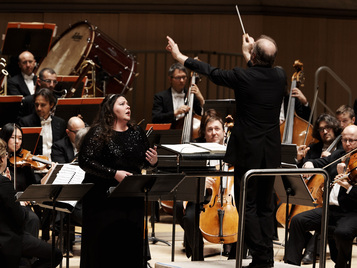 Anglea Meade as Matilde, with Gianandrea Noseda on the podium.
Anglea Meade as Matilde, with Gianandrea Noseda on the podium. The first is that the piece is excessively long. Clocking in at just under four hours, it’s not exactly short – but it’s a mere bagatelle compared with Die Meistersinger or Les Troyens.
The second is that it’s very rarely performed nowadays. But in 2015 it will be staged in London, Monte Carlo, Munich, Paris and Warsaw. That’s not bad for an opera that “nobody does anymore.”
Once again, Toronto had a visiting company to thank for bringing William Tell to town. Italy’s Teatro Regio Torino (Royal Theatre of Turin) is currently on a North-American tour, with concert performances in New York, Chicago and Ann Arbor, Michigan. Toronto was their only Canadian stop.
On the podium at Roy Thomson Hall was Gianandrea Noseda, a music director whose status is currently up in the air, as he has openly threatened to resign his post in Turin. Apparently he doesn’t see eye-to-eye with the Italian bureaucrats he has to do deal with. But from the opening of the famous overture it was clear that Noseda had the full commitment of his superb orchestra, and everyone else on stage.
The results were nothing short of astonishing. There’s plenty of blood and thunder in this score – which may have come as a surprise to people familiar with lighter Rossini fare such as The Barber of Seville or La Cenerentola. And as the piece progressed, climaxes piled up on one another with ever-greater urgency. For sheer intensity and stamina, I don’t see how this performance could be beat.
The cast shone with many musical strengths. Baritone Luca Salsi brought a dramatic and declamatory style to the title role of William (or “Guglielmo,” as the opera was sung in Italian). His voice was rich, in a slightly rough-hewn way that suited the role of the rugged hero of the Swiss nation.
Tenor Enea Scala, as Arnoldo Melcthal, had a complex role to play. (He too is a Swiss patriot, but he’s also in love with an Austrian princess.) He sang with a clear, ringing voice, filled with conflicted emotion.
The love-interest is the princess Matilde, sung by soprano Angela Meade. She was everything her role required her to be, while throwing in some extra virtues all her own. Her voice is sweet and flexible enough for bel canto style, but she could put an edge on her delivery when she wanted to. As well, her sense of phrasing and dynamics made every note she sang compelling.
Almost all the other soloists were in fine form. All three principal basses – Fabrizio Beggi as Melchtal, Marco Spotti as Gualtiero Farst and Gabriele Segonda – gave rock-solid performances. Another impressive cast-member was soprano Maria Bucciarelli, charmingly lyrical as William Tell’s son, Jemmy.
Even more vocal excitement was provided by the Chorus of the Teatro Regio – a glorious wall of sound from the choir seats up behind the stage. Chorus master Claudio Fenoglio did an excellent job of preparing his singers.
I’m not ordinarily a big fan of operas done in concert format: too often I come away from such performances with a feeling that something was missing. Yet even though there were no Swiss Alps to be seen in Roy Thomson Hall, the vivid colours and powerful drama of this performance made for an entirely satisfying performance. Bravissimo!
© Colin Eatock 2014
 RSS Feed
RSS Feed

